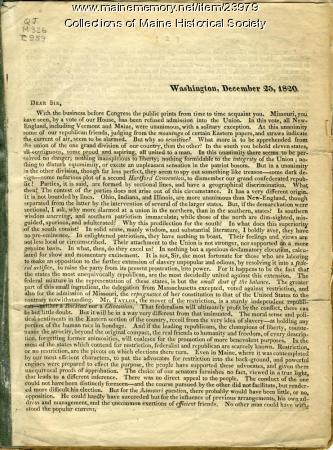
Prentiss Mellen to William King regarding the Missouri Compromise, Washington, DC, 1820
Item 102203 info
Maine Historical Society
Prentiss Mellen was born in Sterling, Massachusetts in 1764 and died in Portland in 1840. He served as a U.S. Senator from Massachusetts from 1818-1820 and as a Chief Justice of the Maine Supreme Court from 1820-1834. William King (1768-1852) became a Massachusetts State Senator in 1816 and was Maine’s first governor from 1820-1821.
In this letter written to King in Boston, Mellon discussed how to overcome Maine’s new connection to Missouri and slavery. Mellen also expressed his gratitude that King’s brother, Rufus King--an ardent abolitionist, had arrived at Congress to help them plead their case.

Senator Holmes justifying vote for the Missouri Compromise, 1820
Item 102122 info
Maine Historical Society
John Holmes (1773-1843) was a state senator of Massachusetts who became a resident of Maine upon statehood and was in favor of Maine becoming independent from Massachusetts. He wrote this letter to his constituents in Maine, which was printed and distributed nationally. Holmes sent it to leading men across the country including to Thomas Jefferson who later sent Holmes a response.
Holmes justified his actions in voting for the Missouri Compromise, which stipulated that Maine could become a free state of the Union if Missouri could become a slave state.
Many people in Maine, while in favor of becoming a state, did not like their statehood being tied to Missouri's, and Holmes used this letter to explain his reasoning for voting for the compromise. After Maine became a state, Holmes was elected as one of its senators in 1820.

Mark L. Hill to William King, Washington, D.C., February 4, 1820
Item 102204 info
Maine Historical Society
Mark Langdon Hill (1772-1842) served as a Massachusetts State Representative from 1819-1821, and from 1821-1823 served in the U.S. House of Representatives. He was a strong supporter of the separation of Maine from Massachusetts. The letter is authored to William King (1768-1852) a supporter of separation, a Massachusetts senator and later Maine’s first governor.
In this letter, Hill described the situation in Congress regarding the issue of Maine separating from Massachusetts. At this point, the question of Maine’s statehood had been left open for nearly two months and tied to Missouri’s statehood. Ultimately, it was determined that Maine could enter the Union as a free state only if Missouri could enter as a slave state, an arrangement known as the Missouri Compromise.
Many Mainers were vehemently against their statehood enabling the spread of slavery. Here, Hill is beginning to waiver in favor of the Missouri Compromise and provides justifications for its inevitability to King. Hill also sees the building conflict of North vs. South as the issue of slavery and abolition become more controversial.

William P. Preble to William King regarding Missouri Compromise, Portland, 1820
Item 102206 info
Maine Historical Society
Although delighted by the arrival of statehood for Maine, William Pitt Preble expressed his disgust with the circumstances in which it was eventually achieved: "The chagrin manifested here is beyond anything I have ever seen... And as to those of our representatives who have done so much to embarrass and so little to aid us; may they not be forgotten."
Many people in Maine were unhappy with the Missouri Compromise which admitted Maine into the Union as a free state and Missouri as a slave state. Preble's letter is addressed to William King, future first governor of Maine.
William Pitt Preble was born in York, Maine in 1783, where he started a law practice in 1809 after graduating from Harvard. He was appointed County Attorney for York in 1811, and the United States Attorney for Maine from 1814-1820. Preble was also a delegate at the Maine Constitutional Convention. In 1820, he became a justice of the Maine Supreme Court.

Mark Hill to William King regarding Maine's admission to the Union, Washington, DC, 1819
Item 102200 info
Maine Historical Society
Mark Hill (1772-1842) served as a Massachusetts State Representative from 1819-1821, and from 1821-1823 he served in the U.S. House of Representatives for Maine. He was a strong supporter of the separation of Maine from Massachusetts.
In this letter, Hill wrote to William King with an update regarding Maine’s potential statehood. Hill reported Maine’s admission to the Union was delayed because of the Missouri Compromise.

Letter about Missouri Compromise, 1820
Item 23979 info
Maine Historical Society
Joshua Cushman (1761-1834) of Winslow, a Democratic-Republican U.S. Representative, wrote a letter supporting the vote of Congress against the Missouri Compromise, which let Missouri join the Union as a slave state and Maine as a free state and forbid the spread of slavery to the West.
Cushman noted that only one New England member of Congress voted for the compromise, Sen. John Holmes of Maine. His letter was intended to prevent Holmes re-election to the Senate after Maine Statehood went into effect.
This slideshow contains 6 items

